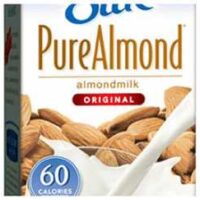In dairy alternatives, almond milk has become a favorite choice for those seeking a plant-based, lactose-free option. Its creamy texture and nutty flavor are often praised, making it a versatile addition to coffee, cereal, and smoothies. But what if we told you that the innocent-looking carton of almond milk in your refrigerator might harbor some not-so-innocent secrets? Beneath the surface, there are potentially dangerous ingredients lurking that you might not be aware of.
In this eye-opening blog post, we’ll delve into some commercial almond milk brands’ hidden additives and harmful components, shedding light on what you need to know to make healthier choices for you and your family. So, before you pour your next glass, let’s uncover the truth about the less savory aspects of almond milk production.

While almond milk may seem like a simple blend of almonds and water, many store-bought brands contain additional ingredients. Let’s take a look at some common ingredients found in almond milk:
– Tricalcium phosphate
– Sunflower lecithin
– Gellan gum
– Potassium Citrate
– Vitamin A palmitate
– Cane sugar
– Carrageenan
Carrageenan
Carrageenan is one ingredient commonly added to almond milk and other health foods like oat milk, coconut milk, yogurt, soy milk, and ice cream. Derived from red seaweed, carrageenan prevents ingredients from separating and gives products a fuller consistency, especially low-fat products.
However, awareness of the potential health issues linked to carrageenan is essential. The chemical structure of carrageenan can trigger an immune response in the body, leading to inflammation. Its chemical structure can cause an immune response similar to bacteria like Salmonella. Inflammation is the precursor to over 100 known diseases, and in the 1960s, scientists linked the food-grade version of carrageenan to gastrointestinal disorders in lab animals. People sensitive to carrageenan may experience symptoms such as belly bloat, diarrhea, cramps, vomiting, nausea, and even more severe reactions like irritable bowel syndrome.
Xanthan and Guar gum
Many brands also contain additives such as sugar, salt, gums, flavors, and lecithin. Two popular emulsifiers found in non-dairy alternatives are xanthan gum and guar gum. These additives have been linked to weight gain and digestive problems. Xanthan gum is made by fermenting yeast with corn or another sugar source to create a thickening agent.
Guar gum, conversely, comes from a bean plant and is very difficult to digest in its processed form despite being a source of fiber.
Vitamin A Palmitate
Another ingredient to watch out for in store-bought almond milk is vitamin A palmitate. This synthetic form of vitamin A has been associated with hair loss, allergies, liver toxicity, and an increased risk of cancer growth. It’s essential to read the ingredient labels carefully and choose brands that do not include unnecessary additives or synthetic vitamins.
Other Potentially Harmful Additives
Aside from carrageenan, guar gum, and xanthan gum, store-bought almond milk can contain other potentially harmful additives. One such ingredient is artificial sweeteners like aspartame or sucralose, which make unsweetened almond milk taste sweeter. These sweeteners may have health concerns, affecting blood sugar levels and triggering cravings for sugary foods. Some almond milk brands may also include synthetic vitamins and minerals, which might not be as readily absorbed or beneficial as those found in whole foods. Finally, preservatives like potassium sorbate and sodium benzoate are sometimes used to extend shelf life, but they may cause allergic reactions in some people. Therefore, checking the ingredient list on almond milk cartons, choosing brands with fewer additives, or opting for homemade almond milk to ensure a healthier and purer option.
Healthy Homemade Recipe
Now that you know some potential concerns with store-bought almond milk, you might wonder if there’s a better alternative. The good news is that making almond milk at home with just a few ingredients and a blender is straightforward. Here’s a simple recipe to get you started:
Ingredients:
– 1 cup raw almonds (soaked overnight in cool water or 1-2 hours in boiling water)
– 5 cups filtered water
– 1 pinch of sea salt
Instructions:
1. Add your soaked almonds, water, and salt to a high-speed blender. Blend until creamy and smooth, running the blender for 1-2 minutes to maximize the almond flavor.
2. Transfer the milk to a jar and refrigerate. It can be stored for 4-5 days, although it’s best when fresh. Shake well before drinking, as it may separate.
By making almond milk, you can control the ingredients and avoid any additives or potential health concerns. Plus, it’s a fun and customizable way to enjoy your favorite non-dairy milk.
Healthy Additions to Almond Milk
Creating homemade almond milk is not only an eco-friendly and potentially more nutritious alternative to store-bought versions, but it also offers an opportunity for customization based on individual health goals, dietary preferences, and taste profiles. Incorporating various additions can enhance its nutritional value, introduce new flavors, and increase its range of health benefits.
Firstly, one of the primary concerns with almond milk, especially for those using it as a replacement for cow’s milk, is the comparative lack of natural calcium and protein. To address this, additives such as organic, plant-based protein powders or calcium-rich ingredients like sesame seeds or fortified organic tofu can be blended into the mix. These not only help normalize the nutrient levels but also maintain a smooth, creamy texture, providing body and richness to the milk.
Furthermore, incorporating probiotics in the form of supplements or by adding probiotic-rich ingredients like live cultured yogurts or kefir promotes gut health. This homemade probiotic-fortified almond milk can significantly aid digestion and enhance the overall immune system, paralleling the benefits found in traditional dairy products.
Another exciting avenue for enrichment is the addition of superfoods, which are nutrient powerhouses that pack large doses of antioxidants, polyphenols, vitamins, and minerals. Examples of these include chia seeds, known for their omega-3 fatty acids and fiber, or cacao powder, offering not only a chocolatey twist but also a rich source of antioxidants. Spirulina, a blue-green algae, can also be a unique additive, teeming with vitamins, minerals, and protein. These superfoods can transform a regular glass of almond milk into a nutrient-dense elixir, contributing positively to heart health, reducing inflammation, and supporting cognitive functions.
For those seeking to enhance the flavor profile while adding health benefits, spices and natural sweeteners present a perfect opportunity. Cinnamon or turmeric can be introduced for their anti-inflammatory properties and a warm, spicy note. Natural sweeteners like honey or dates provide a more nutritious alternative to sugar, imparting a pleasant sweetness while also offering vitamins, minerals, and a healthier glycemic index.
Lastly, for an extra layer of richness and health benefits, one could consider blending in other nuts or seeds like cashews for creaminess, or hemp seeds for additional protein. These ingredients also contribute their own unique set of nutrients, making the almond milk more comprehensive in its health benefits.
To recap, here’s a list of healthy additions to consider:
- Plant-based protein powders (like pea or hemp protein)
- Calcium-rich ingredients (sesame seeds, fortified organic tofu)
- Probiotics (supplements, live cultured yogurts, kefir)
- Superfoods (chia seeds, cacao powder, spirulina)
- Spices (cinnamon, turmeric)
- Natural sweeteners (honey, dates)
- Other nuts or seeds (cashews, hemp seeds)
Know what you Drink!
While almond milk may seem like a healthy alternative to cow’s milk, it’s essential to know store-bought brands’ potential additives and synthetic ingredients. Carrageenan, xanthan gum, guar gum, and vitamin A palmitate are just a few examples of additives that can negatively affect your health.
Making almond milk in your kitchen grants you the power to eliminate additives and take charge of every ingredient. Remember, when it comes to your health, knowledge is power. Understanding the ingredients in your favorite food products and making healthier choices can enhance your overall well-being and enjoy a more vibrant life.



